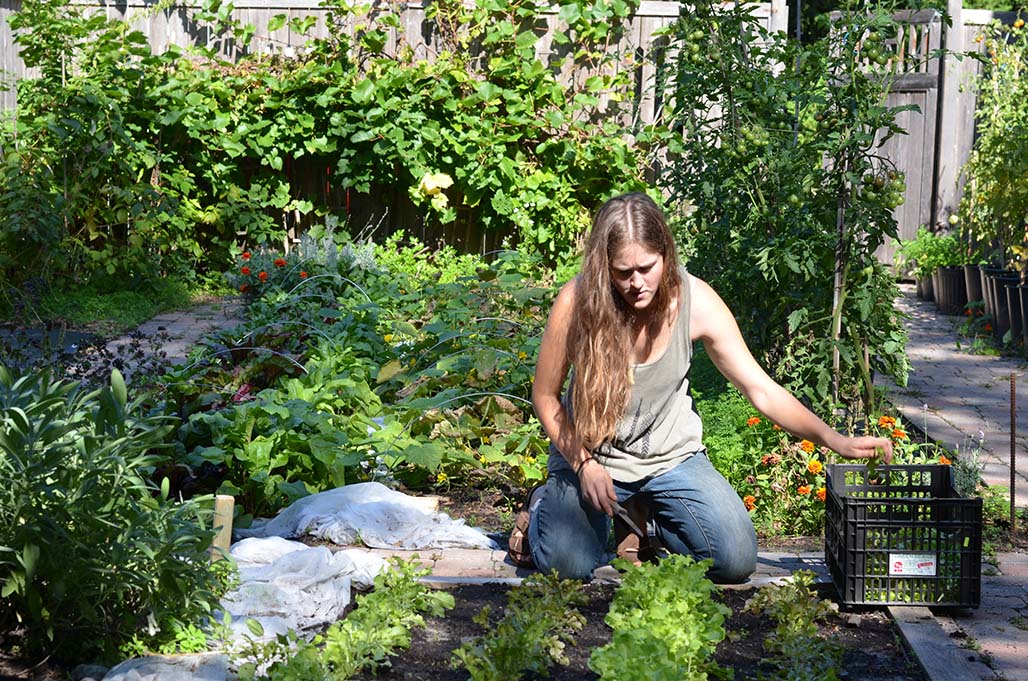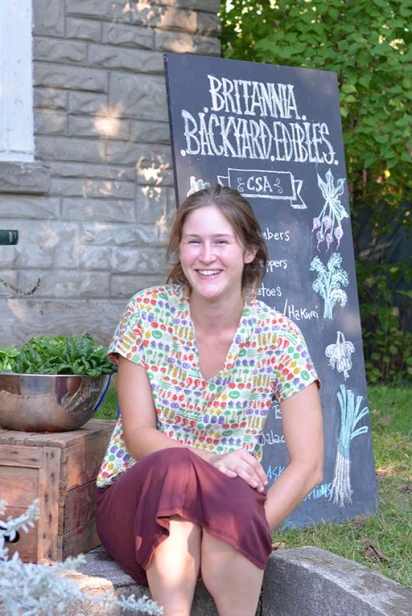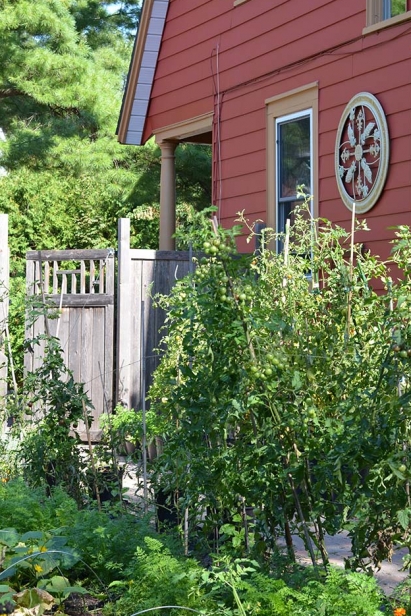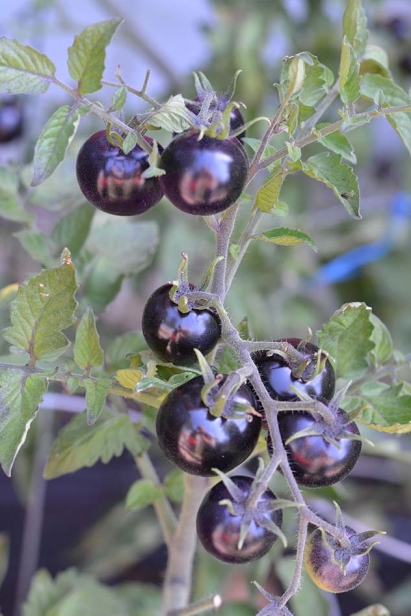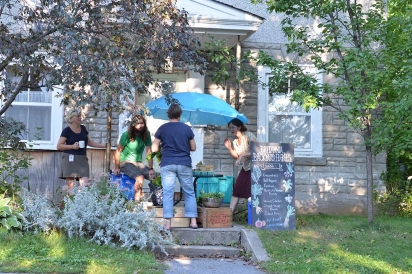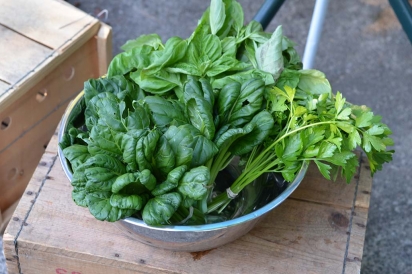Under the Tyranny of Vegetables
Madeleine Maltby is always looking to get the dirt from her neighbours. But not in the underhanded, gossipy sense — in the very literal, earthy sense; Maltby really wants their dirt. She and her partner, Matthew Mason-Phillips, are urban farmers growing an innovative small business called Britannia Backyard Edibles.
“We’re using a farming method called ‘SPIN’ or Small Plot Intensive,” says Maltby. “The focus is on high-value crops that thrive in urban environments and generate high yields in a small surface area.”
For Maltby and Mason-Phillips, those small surface areas are “borrowed” plots in residential Ottawa, namely Britannia and Westboro. Some plots are already established garden beds, but the young entrepreneurs are also willing to dig into grass lawns or even seed on rooftops. Last spring, after Maltby went door-to-door to promote the brand-new venture, Britannia Backyard Edibles took root in four yards.
“People were kind of like, ‘You want to do what with my backyard?’” recalls Maltby when she approached neighbours about gaining access to their yards. “But other people had heard about urban farming and were really interested and excited that something like this was going to happen in their neighbourhood.”
Maltby explains that the vegetables they grow are harvested for Community Supported Agriculture (CSA) shares, much like a coop. A full share costs $500, and provides approximately $30 worth of vegetables per week, for 18 weeks. A bi-weekly share costs $250, and provides approximately $30 worth of vegetables every two weeks, for nine weeks. Homeowners who offer up growing space to Britannia Backyard Edibles can choose to participate in the CSA at a discounted rate, or opt to harvest a section of the garden at their own leisure.
Growers also have the added pleasure of a beautifully kept garden growing all summer long, not to mention the marvel of seeing the diverse bounty that grows from it. The early season produces arugula, spinach, peas, salad mix, Asian greens, green onions, young garlic and garlic scapes, kale, chard, radish, hakurei turnips and mixed herbs. Mid-season crops include beans, carrots, beets, tomatoes, peppers, cucumbers, zucchini, pattypan squash, potatoes and melons. The fall yields a harvest of garlic, cabbage, storage onions, winter squash, spinach and kale.
Mason-Phillips says the weekly CSA pick-ups were a huge highlight of the summer, when the members would excitedly arrive to see what bounty was in store for them.
“It all kind of comes together, all the hard work,” he says. “Pick-ups were like the social hour; it gave us a lot more exposure as well.
“Our customers want to buy local and they want to buy organic.”
While Mason-Phillips recalls both of his grandmothers being avid gardeners when he was a child, it wasn’t until he met Maltby that his interest in growing was rekindled.
“It was always in the back of my mind that I wanted to embrace some degree of self-sufficiency,” says Mason-Phillips. “This is how I can make it happen here, right now.”
Maltby says her dedication to urban farming originally stems from her passion for the environment.
“I had an interest in the environment in the beginning, I always have.” she says. “But not necessarily the gardening, farming and growing food aspect of it.”
The farming element began to flourish while Maltby was pursuing her post-secondary studies.
“I was studying Ecological Restoration at Fleming College in Kawartha Lakes when I sparked an interest in organic farming,” she says. “There is a really strong farming community around the Peterborough area and it was there that I started volunteering on farms and getting my hands dirty.
“I was immediately drawn to it,” she recalls. “I loved getting my hands in the soil — it was so rewarding.”
Later that summer, Maltby continued farming through Worldwide Opportunities on Organic Farms (WWOOF) while travelling around Vancouver Island. It wasn't until 2013 that she decided to take her farming education a step further by interning at Rainbow Heritage Garden in Cobden, Ont.
“From seeding and greenhouse to harvesting and arranging vegetables for market — it included everything,” says Maltby of her seven-month internship. “I lived on the farm as well, so I was completely immersed in farm life.”
Back in Ottawa, Maltby’s plan for Britannia Backyard Edibles started to germinate. Following last summer’s inaugural success, Maltby and Mason-Phillips are keen to break ground on their second season. They’ve doubled their city growing space — with eight plots lined up in Britannia and Westboro; four of which are repeat customers from last season.
“A lot of our CSA members have told us that they want to continue this year as well,” says Maltby, adding that they are still taking names for new members. “We’re planning for an 18-week CSA season, and we’ll also be selling at the Westboro farmers’ market from May to October.”
Britannia Backyard Edibles is also nurturing two new branches of growth this year. The addition of a half-acre plot of land in rural Kanata will allow extra growing space.
“It’s going to allow so much breathing room,” says Mason-Phillips. “When you’re dealing with limited space in the city, you have to pick and choose which crops you want to grow.
“We’re actually doing a lot of new crops, including potatoes, winter squash, sweet corn and melons.” He adds the Kanata space will also be a new home for growing garlic, which is a passion of Madeleine’s.
The second area of expansion is a year-round indoor production of micro crops, thanks to a new warehouse space at Makerspace North. The location, set up back in January, will be a “grow hive” for new plants.
“It’s a co-working space — they help start-ups,” says Mason-Phillips. “This will be the new, permanent home for seedlings and microgreens.”
Microgreens — the early stages of a developing plant — are coveted by high-end restaurants for use as garnishes. “Right now, we’re growing for Pure Kitchen and Soca,” says Mason-Phillips. “They have really fun menus and they just love microgreens.”
With a very short germination period, Maltby and Mason-Phillips are quick to agree that tending the microgreens is a huge amount of work.
“It’s like having a thousand children who are totally needy,” jokes Mason-Phillips. “We get to work for ourselves — but under the tyranny of the vegetables.”
But for all the effort, it doesn’t seem the pair would change a thing. “At the end of the day, this is what we love to do,” says Mason-Phillips.
Britannia Backyard Edibles
britanniabackyardedibles.com, 613.716.7661


